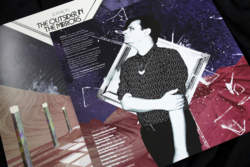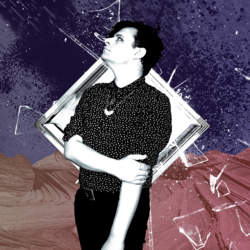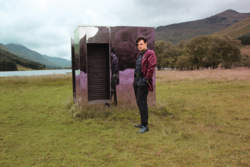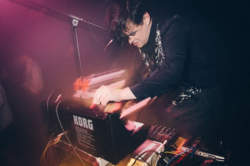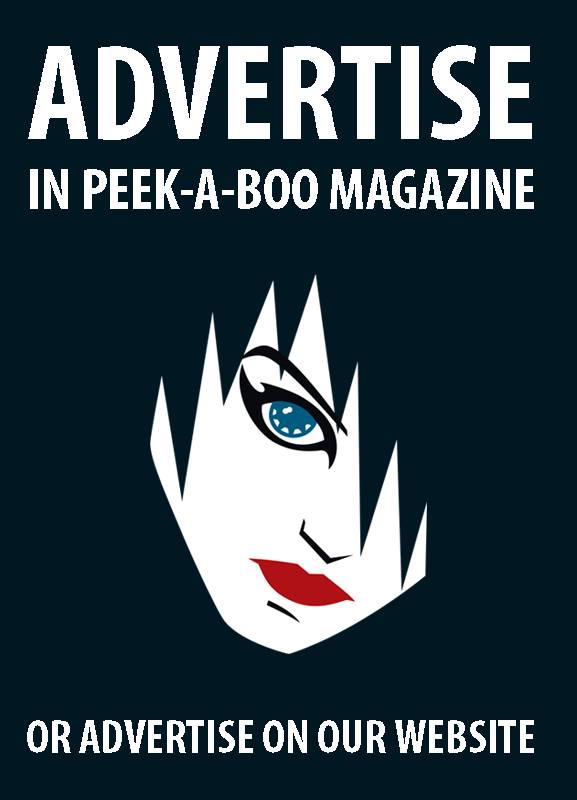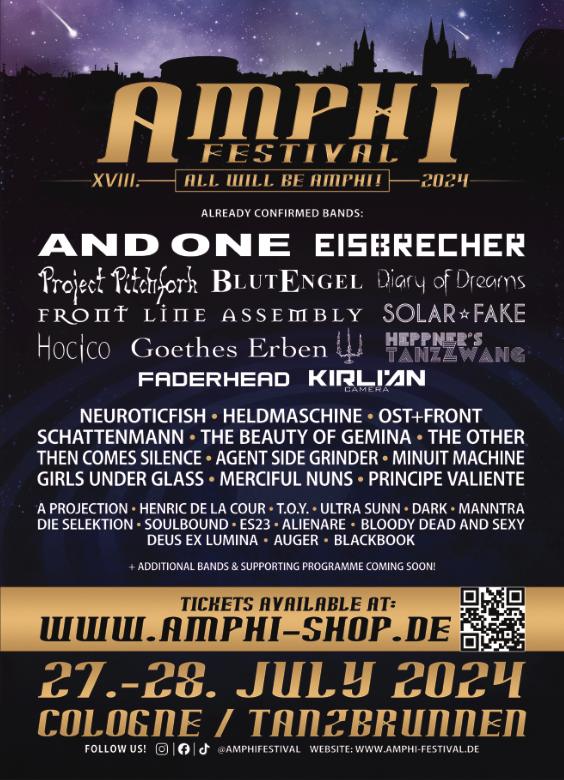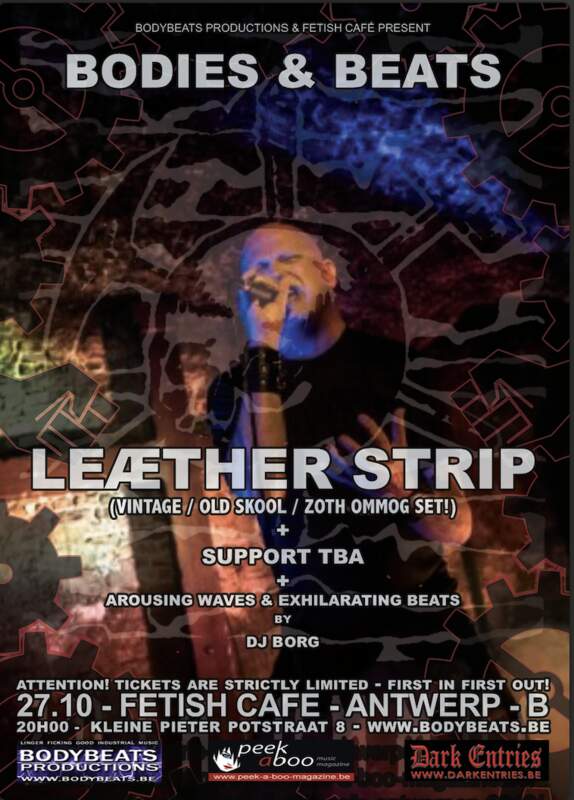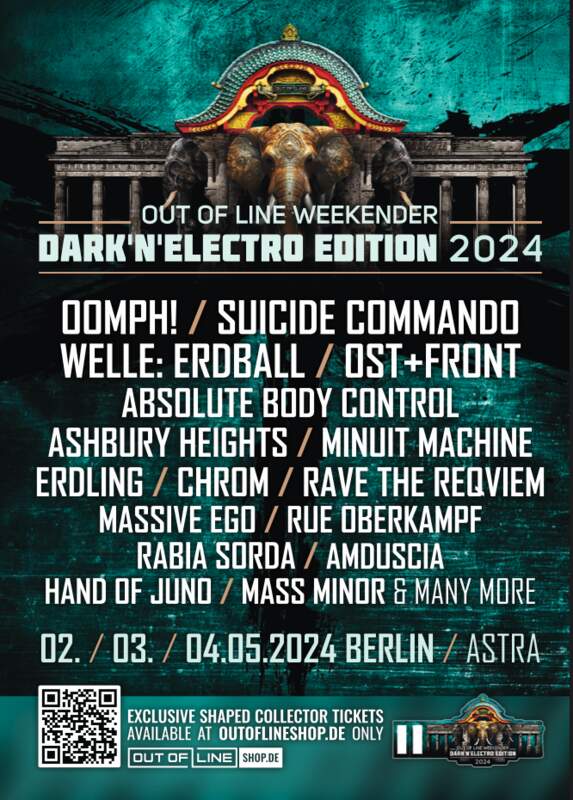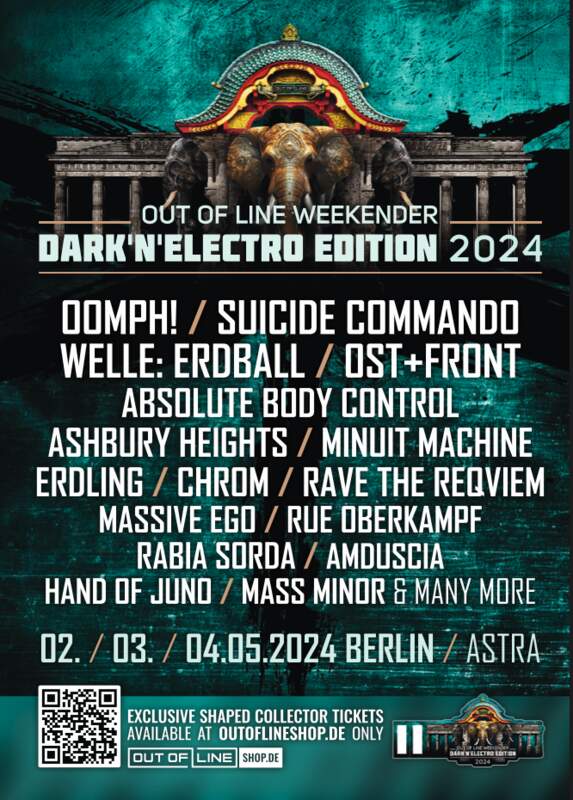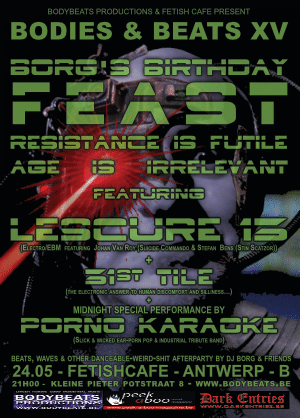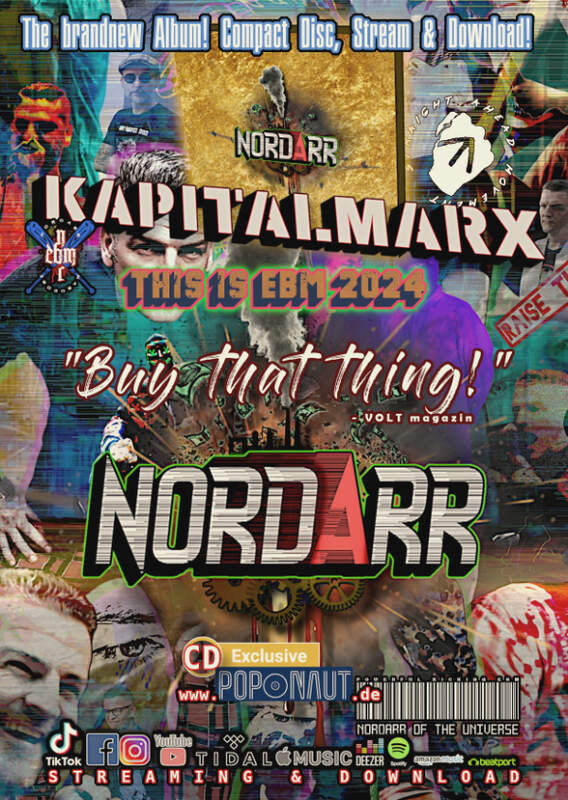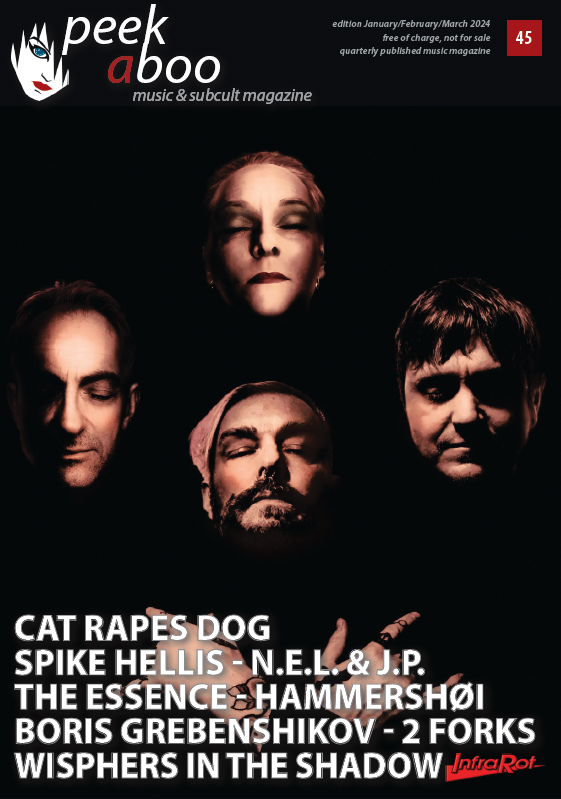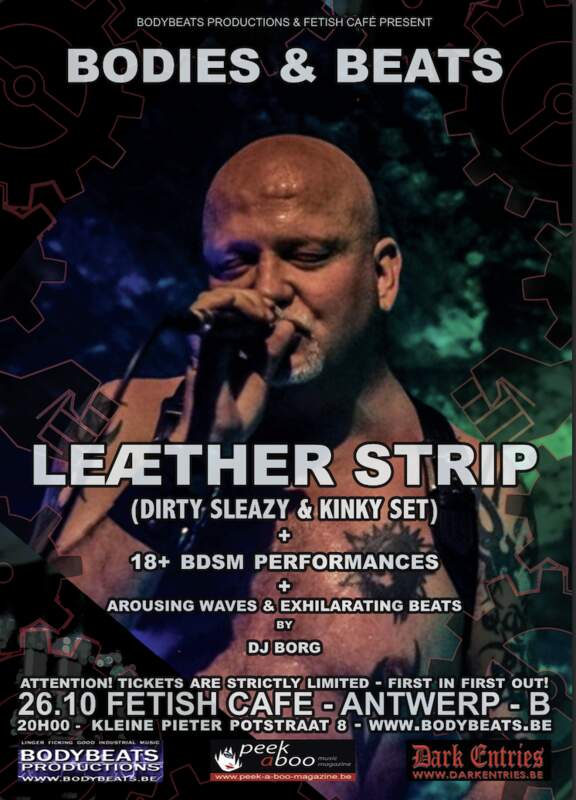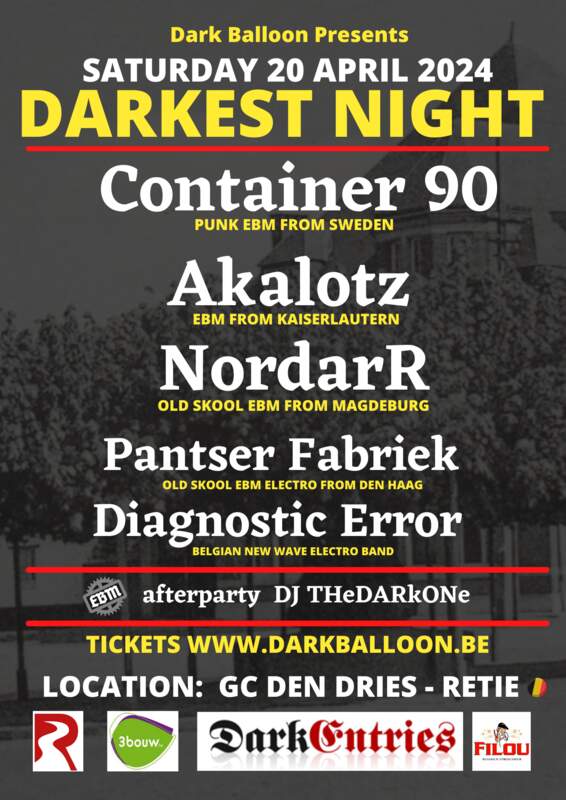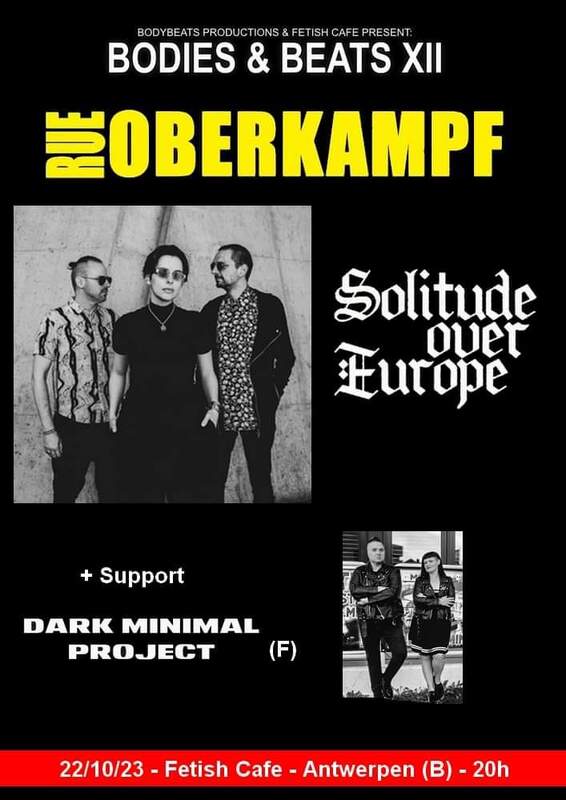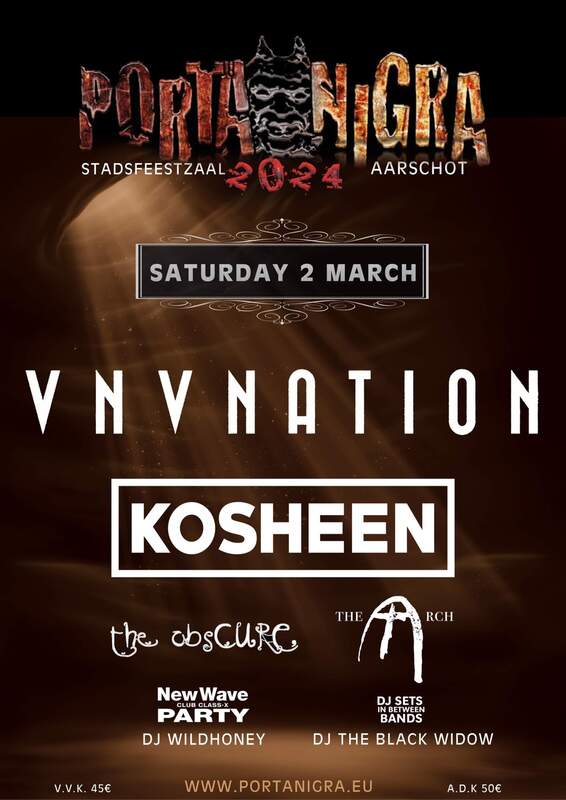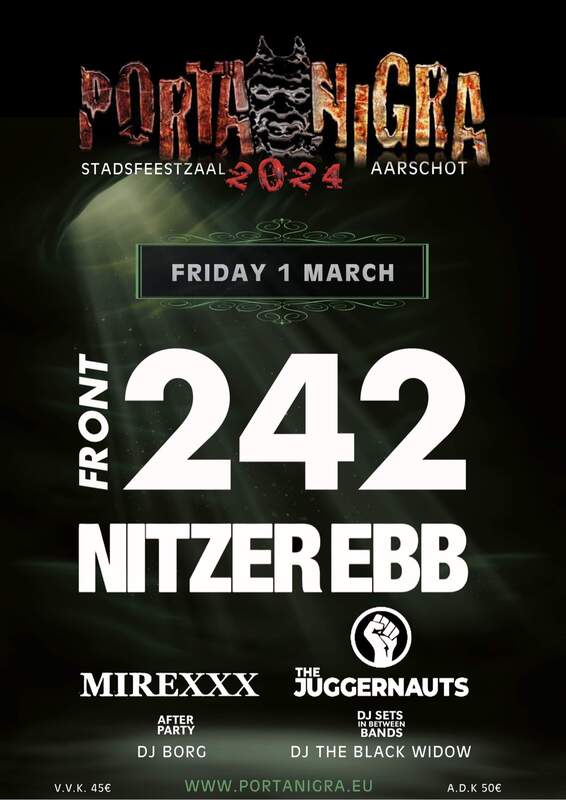SOFT RIOT
Jack Duckworth talks about Soft Riot
08/03/2018, Marija BULJETA
Soft Riot is a solo project of the Canadian artist Jack Duckworth (JJD). However, Jack has been living in the UK for the past decade where he became a notable part of the synth music scene. His sound is rather distinguishable; it's described as minimal synth art-punk disco by the artist. Although one can hear various musical influences in his work, Soft Riot's artistic expression has its own distinctive signature. Jack is undoubtedly inspired by the world that surrounds him, life experiences, impressions and ideas, rather than music history alone. He is interested in exploring new sound possibilities and he's open to experimentation. His sixth album, The Outsider In The Mirrors, will be officially released on 9th February on Possession Records. Jack kindly agreed to answer a few questions before his first 2018 tour date.
Prior to Soft Riot you played in punk, hardcore, post-punk/new wave bands, if I'm not mistaken. Can you tell us how that felt compared to what you're doing today? What made you choose the electronic sound after experiences with punk and post punk?
Jack: Yes, that’s how this whole journey properly started, when I was around 14 years old. Before that, when I was a child, I was into random bits of music, like the soundtrack to “2001 A Space Odyssey” (Ligeti in particular), some bits of Depeche Mode and Canadian synth/rock stuff. My stepdad was always playing mid-80s Rush albums (the more synth-heavy ones) in his 1980 Pontiac Firebird. Maybe that rubbed off?
The town I grew up had a big skateboarding and snowboarding culture, which at the time was tied into the punk scene. I was attracted by the DIY ethic, sense of community, and accessibility; people forming bands together, putting on small shows and writing zines. It also catered to the feelings of angst and politics that was growing within me at the time. I eventually left home and moved to Vancouver and got even more involved. This was around 1996-1997, I guess. From there I discovered a lot of music that was very experimental and presenting new sounds working within the punk and hardcore genre.
By the mid/late 90s a small group of bands within that Canadian/US underground scene started bringing in keyboards and elements of what was then just known as “80s/synth” sounds; bands like The VSS, Satisfact, The Faint and even The Rapture when they were first starting out. It was a total revelation hearing these bands using those sounds in a different context and within the scene I was active in, especially at that time when synths were totally out of trend. Before that I associated synth music with what you’d hear on music television or LPs you’d find in the sale bin at the local mall record store. It was now being done by people I could relate to and interested in the same things I was in.
Around this time I started discovering a lot of classic and less known goth, post-punk and synth pop. I was finding something that resonated with me quite a bit as the atmospheres, sounds and moods better matched how I felt and the landscape of my mind. The aesthetics and emotions felt right and like home. From there the course of my musical output shifted; synths, post-punk, general gloominess all around.
All these years later it feels like it’s coming full circle. In the last 5-10 years I’ve become quite connected to fellow musicians and music lovers in the underground synth/wave scene in Europe. There’s a lot of similarities to the sense of community, experimentation and passion for music that I felt when I was younger and involved in punk. The sounds might be different but the feeling is exciting and familiar. It is a truly great thing.
What is it like to be a band member as opposed to being a solo artist?
Jack: There’s definitely unique experiences to being a solo artist that you wouldn’t get being in a band. You discover that there’s pros and cons to doing music on your own. Starting out it just made sense; the early Soft Riot stuff was mainly just messing around and documenting a specific sound I was doing at the time. The music was very minimal and didn’t require anyone else to play it.
Obviously that allows the music to be a far more personal thing, as it’s more of a documentation of a singular artist rather than a collective. I go off on tangents or ideas with far less restraint. I can get as heady and particular about the sound and how it’s presented as I like. I’m free to travel where I like and be as busy or as not busy as I like and often I don’t have the time factor in working with other people.
I guess being a solo artist is more stable. I had been in many bands before and have had friends in many bands. They can split up, dissolve or have the collective of musicians push each other to the breaking point trying to get to the next level until the wheels start rolling off the wagon. I have a very realistic view of how being a musician is today and how my music fits in with other things going on. It’s not 100% accessible. It’s a bit weird. I have no fantastical ideas about making it or quitting my day job. It is what it is. It’s got a more efficient footprint on the musical landscape.
Of course being solo has its downsides. It’s a lot of work as, well, you have to do everything. You have to be your own booker, manager, producer, etc. I can get very self-critical or existential about being a musician in the 21st century so that can hinder me getting behind it. One needs to ride the excitement of the experience or have a relatively big enough ego, or a combination of both, to really push it. Some days I don’t have either of those. Some days I do. I’ve learned to work with these things. After six some odd years of doing Soft Riot as my one, full time project I’m getting good about controlling how I feel and how to keep things moving along. And it is moving along.
Your artistic expression can't be described easily. How would you describe the peculiar sound you create? Where do you find the inspiration apart from the music influences?
Jack: Yeah, I’m still trying to figure out how to really explain it, as there’s a lot of overlapping layers that can be complex so here go… When I was younger and playing in bands I think I used to have more specific points of reference to what I was writing. I’ve been working with those points of reference for two decades now and many new, further-reaching points of reference have been incorporated. As I get older my personality is getting stronger, more focused and arguably more eccentric. That drives the creation of the music more than what I listen to or am influenced by. I would venture to say that my music is somewhat held captive by my personality. There’s many details and “trademark” things that I do that I’m aware of, and that will occur in the music no matter what new directions I take with writing music, even by force. I’m aware that they’re there and I’ll try avoid or exploit them as I like.
I’ve been listening to things like post-punk, goth, synth pop, minimal wave and italo for many years, of course loving a lot of it and have explored the vast corners of those genres. I’ve been involved in the scenes related to those genres for a long time as well. However, I don’t think I could just do some sort of tribute to them though. It feels two dimensional to me and like I’m wearing someone else’s clothes and mimicking their mannerisms and ideas. It all goes through my own filter, which is about music but also my observations on life, observations of the world or just images from feelings.
Sometimes music feels like acting out a version of myself. At other times I want to experiment with theories and structures of music, like seeing how certain chord progressions work, time signatures, overlapping phrases and counterpoint of instrumentation. How many times can I remove certain beats from a measure to mess with the time signature before anyone notices? Things like that.
Other times I want to try something out with the lyrics. On a number of tracks I tried writing a narrative for the lyrics. There’s some songs across a few albums that are short, fantastical stories. They were mainly experiments to try those ideas out.
Music can be a tricky thing for me to work with. I love it and is a major driving force in my life but I get annoyed by a lot of things about it at the same time. Some days I don’t listen to music at all, including my own music, as the patterns and repetition of ideas I keep hearing drive me fucking nuts! Ha! Other days I’ll disassociate myself with Soft Riot and do other things, generally just enjoy life and just be a friend hanging out with other friends, not talking about what I’m doing musically at all.
As for other influences? Aside from music, I’m really into film and from that some television. It can be high art or total low-brow trash. I’m attracted to the cinematography, images, interplay of dialogue, the changes of feeling and emotion and, of course, the sound design and soundtracks.
Your work is rather biographical. You don't tend to please the world, but present your own ideas about it. What kind of feedback do you receive from media and audience about that kind of the creative approach?
Jack: This all ties in with the above question. I like working with things that are familiar but have a lot of ideas I’m putting into the music. The later albums I’ve been playing around with ideas that are even more familiar, but keeping at hand all my quirks present in what I write.
Albums reflect different phases. No Longer Stranger was a summary of a few really dark years feeling behind the flip side of life. Fiction Prediction was about my time spent with friends in London and in Europe and was expressing romantic, yet melancholy sci-fi daydreams and incorporating more synth-pop elements. I was going for a cinematic approach because I had been doing in-your-face post-punk stuff for years. I was temporarily bored of it.
When I first started playing live as Soft Riot I was a softly-spoken alien character riding a lonely spaceship and yet I was playing mainly shows for post-punk/synth audiences. I know it reached a select audience and didn’t appeal to some. But that was something I was trying out. However, the punk roots were always under the surface. That and gathering confidence and ease working with my musical tools gradually started putting more energy back into the music and live shows and it became more “me” rather than an experiment.
Artists that are more willing to adapt stylistic points of a particular genre will generally resonate a lot better with audiences as they tap into feelings of familiarity, camaraderie and elements of music that a receptive audience already know and love.
Some people have told me that what I’m doing really connects with them. Some people have told me that they didn’t like what I was doing when I first started but have really latched onto it in more recent years. I overall feel comfortable and at ease with what I’m doing now and that’s a good feeling.
But I’m not someone totally self-absorbed with what they’re doing, like that often repeated cliché of an artist stating they’re “living and breathing their music 24 hours a day” or whatever. I’m aware of my flaws and elements that aren’t totally accessible. I’m often guided along by the forces behind the music, which at times seems more powerful than me living in the present. Overall, the sharing of ideas and a vehicle of expression supersedes everything, whether it’s accepted or not. One of my favourite things is meeting and becoming friends with artists and music lovers and discussing how we all work, where our ideas come from and how we view the world.
Although some of your repertoire has a heavy and dark atmosphere, there's a lot of humour and irony present. How do you combine the two?
Jack: These elements you’ve mentioned are at the core that makes who I am. As my personality becomes more intertwined with the music, they’ll all surface. I am prone to feelings of depression, alienation and anxiety. I don’t say that to add validity to what I’m doing. It’s just there. And often I don’t enjoy it. I’m not unique in experiencing that however as any people, including close friends I know, have all had their own experiences with this and through the music I want to relate to that.
And then there is humour, which is also a part of me. I’ve always attribute humour to workings of intelligence, and a mechanism to deal with and filter the black feelings within. Often the two intertwine, fighting it out in my mind. Humour can also be a good icebreaker and healing mechanism. Some of my best moments with people have been having a laugh when the shit is going on down around you.
The humour in Soft Riot’s music is pretty black and very subtle. Offhand you won’t really notice it. There’s some elements within the music itself that is me having fun with the music and fucking with things like metre, sounds and people’s expectations. I’ll be like “it’d be funny to have some orchestral hits in this song” and then they’ll appear and most won’t notice it. I love the drama and emotion of music but also working and being aware of what I see are clichés in music.
And as far as lyrics go I play around with words or add little satirical lines here and there. There’s sometimes things that resemble punchlines that bring new meaning to lyrics elsewhere in a song. There’s artists that I love that work the these two elements well. Nomeansno’s Rob Wright had select moments of brilliance and could be very playful with words, using a lot of black humour, being slightly camp and yet sounding absolutely terrifying while at time. As for classic synth artists, Fad Gadget laid the black humour on pretty thick. Even Peter Murphy in his Bauhaus days wrote some colourfully bizarre lyrics.
Influences come from camp and awkward moments of arts, music and culture. And obviously I’m into comedy. You could connect the dots with things like The Day Today or Brass Eye. And then there’s of course my favourites being the closest aligned to me, The Kids In The Hall, who mastered bringing together the absurd, bizarre and weird that was at times a bit dark.
Having moved to Glasgow, it’s a scene that has a lot of artists working with more morbid sounds but there’s always some black humour woven in, lyrics or otherwise. So I observe how others do it. My label mate Hausfrau is a good example as she applies her own humour into the music at times. It’s part of the culture here, I think, and something I relate to.
Times up for that one! There’s the beginnings of a university media studies lecture there…
What does your recording set up consist off?
Jack: Well, the set-up has been pretty much the same for most of the albums I’ve written. I’ve got 3 mono-synths, and a few polys, some outboard effects going through a 16 channel mixer. That goes through an audio interface and I use Ableton to write, produce and mix the tracks.
I love working with gear, but I’m not gear-obsessed. I think I just like the physical working space that they provide the live interaction with it. I’ll use anything really. I have some soft-synths I use at times when I want to get extremely detailed in how the phrasing of a particular instrument is within the track. There’s new additions I’d like to add, but I was still milking out sounds of the ones I have. It’d be nice to add synths that use a different synthesis model (linear, wavetable, etc) and some outboard stuff to expand the sound of production.
In the end it’s not really the gear that makes the songs. Most of the ideas come to my head when I’m not even around the tools to write music. Maybe I’ll be watching a film, on a train or walking around — hell, even washing dishes. I’ll then quickly sketch it out and then spend time moulding those sounds in my head into synth patches or whatever. Most things are planned but some can be happy accidents.
Can you tell us something about the technical aspect of your live shows? How do you choose the tracks for the set?
Jack: People have said it’s like seeing an octopus on stage, playing numerous things at once. My label mate Andy has said “It’s maximal wave. You don’t make things easy on yourself, do you?”, which I thought was charming. Both fit.
I like the physicality of playing, moving around and the demanding nature of the work to be done when playing. It does cause a lot of pre-show anxiety however as there’s so much to think about when doing a set. But like always, as soon as I’m 30 seconds into the first track and it’s all clicking, the rest just sort of happens and I get lost into it. It’s a physical performance. I also like how my live set-up makes up for the fact that it’s just me on stage and creates a presence.
As for my set-up, I’ve got a number of synths all going through a mixer that I can set levels for each synth, fade elements in and out as well as increase or decrease FX levels on each track. It all comes from Ableton, which basically plays the produced drum tracks, some instrument bed tracks but mainly sending out a lot of MIDI commands to trigger patterns on synths or change patches. I don’t have any time to mess around looking for patches in the middle of a song. I don’t have enough hands.
In terms of choosing tracks, mainly I choose the newer ones that I’m doing or the ones that I know get a good response in a live setting. This year I’d like to mix it up more so I’ll need to find more time to focus on prepping the live set for shows in 2018 and beyond.
I read somewhere that you also did your own production. Is that still the case? How demanding is that aspect of your work?
Jack: The Outsider In The Mirrors is entirely self-produced and I’d say it’s the best produced of the albums I’ve done. Like many things, the timeline of experience offers skills and improvement. For this one I did the final mixes in a rehearsal studio here in Glasgow with my friend Josh listening in as a second pair of ears. I wanted to hear how the songs sounded on a massive PA. It really helped with how to mix the lower end frequencies in the tracks I was mixing.
For me, the song-writing itself is very tied into the production and how the albums are mixed. I can get really particular about how things should sound and adding in the little details but I also don’t want it to sound too perfect. There’s a lot of “mistakes” — things slightly out of sync, falters in the vocal performance. It makes it more organic. Electronic music can easily be far too quantised and sanitised. I think a lot of that stems from people self-producing their albums and getting overtly precious about making them perfect — and when self-producing this perfection ties in heavily with an artist’s confidence and self-esteem about the music they’re producing.
I do work with other people at times. My previous album You Never Know What Might Come Next was mixed with my friend Owen Pratt from Uncanny Valley at his studio in London. I like his production style and wanted to see what magic touches he could put on the music from the bed recordings I did in my own studio. He’s great, and I learned a lot of things that I applied to this latest record with what I saw as improved results.
Mastering is really important as well. The last few records have been mastered by Josh Stevenson at Otic Sound in Canada — an old friend of mine from “back in the day” who understands what I’m doing musically and it gets a really good mastering job done.
Your new album, The Outsider In The Mirrors, is your sixth full length album. What are your own thoughts about it? Would you say it's a conceptual album? If so, what's the main subject? What's the idea behind the album title?
Jack: Offhand, I would say it’s the most direct, the most accessible and to an uninitiated listener it would come across as my most personal. In a way it is. But “personal” depends on who you talk to and what sort of music they like.
There are two main differences with this album; a lot of the songs were written and played out live before committing them to a recording, whereas previously it was the other way around. Compared to the other albums, it’s got a feeling of a band that’s played live, rather than a studio endeavour.
Secondly, the album was written in the migratory period of living in Sheffield and then in Glasgow. This exposed bare some deep feelings of alienation and lack of belonging. I felt rootless and disconnected and felt a need to write something that was reaching out to an audience and trying to be included. Previous albums felt like I was building this strange little world and letting people come in and take a peek. I’m trying to climb out of that world and connect.
The title of the album just sort of came to me, the words themselves and the imagery. Sort of like those old Italian 70s horror films where someone is crashing through glass in a very stylised, slow-motion manner. But as these images came to my head I started to think more about and see if there was underlying reasoning for the imagery. Like a lot of things I create, there indeed was.
The concept could be that of a hall of mirrors. You’re seeing bits of yourself here in there. Parts from the past living in different cities and not being able to connect to them anymore. Coming and going from places I used to live, not really feeling home anywhere, and have been to after big gaps of time and it sort of feels disorienting like time travel. I think a lot of it has to do with feeling alienation in modern life. Our physical selves get fragmented about ourselves in the digital world. A lot of people I don’t see in the flesh a lot, so I just see these avatars of how they present themselves online. Getting glimpses of them here and there but never actually seeing them, or even really even feeling who I am at times.
This gets wrapped up in events, information and the ideas of millions of other people online. There’s trying to connect to people and not get a response. Everyone’s busy and dealing with their own problems or keeping with what they know. There’s any number of concepts and ideas that fit into this and it’s easy to understand how someone can feel completely lost and detached from it all. In the last couple of years these feelings are really strong and present in my life.
Emotions are noticeably more real and heavy so to counteract that I’ve tried to have more fun with the songs, despite the fact that to most they’ll still sound dark and somewhat sombre. There’s less dissonance in the atmosphere of previous albums and more sharper sounds. It’s more bouncy and a bit cooler in using the dramatic chord progressions I’ve used on previous tracks.
Does this answer the question? I’m not sure but it’s what’s coming off the top of my head at the moment.
What was the reason for setting up Possession Records? How did you start the label and who's involved in it? Is it difficult these days to get a good record deal or find a suitable record label?
Jack: When I was getting the demos together for the new record I was getting ready to send them out to labels to gather interest in a release. But something deep down felt very wrong and I thought about why I was feeling that way. Over the years that I’ve been putting out records, they’ve all been across a vast pool of unrelated record labels. Most of those don’t exist anymore. Some of those labels didn’t do the best job. I thought: “I’ve been doing this a long time. If you don’t like how someone else is doing it — do it yourself!”
I felt I had the organisation, attention to detail, the caution of experience and a bit of money to get it going. I’ve got plenty of creative fuel for future recording so having them all in one place in the future seemed like the best idea.
So we have Possession, a label started by myself as well as Claudia from Hausfrau and Andy from Ubre Blanca. Both I had met through doing music before I moved to Glasgow. All three of us had common intersecting interests and do music that’s somewhat similar. Trends nowadays point to people doing more boutique labels. It’s easier to do now that things are more connected online. A lot of newer records I listen to come from labels that have an identity of their own and I think that’s how I see Possession going. We’re into the visual and video aspect so that’s something I’d like to try and utilise more to make the label unique.
You have already announced your 2018 tour. What can we expect from the shows?
Jack: It’s less of a tour at this point and more so regularly-occurring clusters of shows and some festivals. Booking a continuous tour is something that requires a lot of time and resources that I’m looking to find at the moment, but a semblance of a tour might start to form. I’m balancing out doing the PR and video promotion work for the label.
One thing I’m looking to do is go back through older material and re-work some of those older tracks into a live set, making them a bit more unified stylistically as to what I’ve written on the new album. I always feel that songs that have been set in a recording can always be tweaked long after they’ve been recorded to work in a current context. I’ve also got new songs in progress that I want to work with live to decide how to finalise them.
I think, overall, I’d like a wider range of songs to choose from live, so each show can be a very different selection of songs if need be.
But yeah, I’ll be doing shows in the UK and Italy in March, a few dates in Canada in April including the Verboden Festival in Vancouver and then working on further European shows for 2018, including an appearance at Return To The Batcave Festival later this year.
You played at festivals as well. How much does the festival experience differ from the solo show regarding the set list and the overall performance? Is there a particular festival you would really like to play at but still haven't?
Jack: As of now, playing festivals and straight up shows don’t really differ. Mainly as I’ve only played smaller festivals. I suppose there’s more organisation involved, playing more unconventional time slots and more importantly, conserving your energy when festivals can be a marathon of taking in good music and DJ sets. Playing a proper big festival would present new challenges like how to command presence on stages that are massive and usually the home of bands with a lot of members to fill them.
I’ve played Gothic Pogo and Kalabalik and those were my two favourites, I think. They’re both like a big family reunion paired up with good bands and music you likely wouldn’t hear at many other places.
There’s a lot of good underground European festivals like Waveteef, Young & Cold that would be cool to play. There’s so many festivals — I suppose the opportunities will present themselves or something will lead me to pursue looking to play them. I’d like to play some UK festivals. The UK is very music-business/trend oriented comparatively and it would be interesting to drop myself into one of them and see how it goes over. Those festivals seem really, really alien to me but that’s part of the appeal.
You have filmed a lot of videos so far. Do you consider them a vital part of your work or just a promotional tool?
Jack: More and more the video aspect is becoming an extension of the ideas I have for Soft Riot. They overspill from the music and into the videos. There’s a lot of things I can’t express in the music so I try a different approach in the visuals. However, it’s a work in progress as I’m having to plan and execute a lot of techniques. But I enjoy the process and obviously for someone who’s into film it gives me a chance to play director for a bit. Plus creativity that comes with choosing the metering, pace and choice of visuals is very similar to creating a new song.
And this all picks up from the part I was explaining before about humour; it’s obvious with my videos that the humour is a lot more present. It’s a bit of a dangerous fine line trying to figure out how much humour to put in there. I like riding the fine line between absurd and animated with being borderline terrifying. I’m fascinated with TV as a mass media control and marketing mechanism, adverts especially. I’m also trying to explore some new ideas that differ from how a lot of synth/wave artists present themselves in videos. I’m serious but can poke fun at the stereotypes a bit. The same concepts behind the music but used differently for the videos.
In more recent videos, I’ve been inserting characters that have been drumming around in my mind for a long time. Some are regularly occurring, such as the newscaster “Derek Laser”. I’d like to extend the video presentation beyond the traditional idea of a band music video. At this point it’s a question of time and hopefully collaborating with some friends to do more of that sort of thing in the future.
You are a graphic designer by profession. Have you done the album cover art as well or did you have some help?
Jack: All of the artwork is done by myself and is based on the collage work I’ve been developing over the last 20 years in my graphic design career. There is a “Soft Riot” style I’ve been honing into to create the covers; surreal, posterised, psychedelic mental fantasy would probably describe it best. It’s something I can get totally immersed into doing and the result gives something that I think is different than what one would expect from a synthpop artist. I do get some help setting up photos etc, namely by my partner MM Lyle when she’s got some free time.
Soft Riot collaborated with other artists. How did these collaborations look? Can you name some of them?
Jack: I imagine the collaborations you’re referring to are the “remixes” or track re-working I’ve done for other artists. It all started because a few friends asked me or the idea to do it came up in conversation. For instance, my friends William and Larissa from Lebanon Hanover were staying at my house a number of years ago. I said I had an idea of how their track “Die World” could sound different. It was more just hanging out and sharing ideas. Same goes with other remixes I did for Keluar, Noi Kabát, etc.
From there people heard them and other artists asked to work on their tracks. That whole process was interesting as they weren’t my songs but I could flex some production techniques I was working on within the Soft Riot tracks to another artist’s tracks. Those experiments in turn influenced the writing of my own Soft Riot work. A lot of them were fun but doing remixes can be hit or miss. I only really do them if an idea starts going around in my head as to how I could make something new from the original track. Sometimes people ask me to do a version of their track but I don’t get any ideas so I don’t do it. Sometimes people put deadlines as to when they want a finished version from me but sometimes it takes weeks or months to find the time to work on them, let alone the time to just run the ideas around through my head.
Where can fans buy The Outsider In The Mirrors? Where can they follow the latest news about Soft Riot?
Jack: If you’re a savvy user of the world wide web and love getting things in the post, you can go to www.possessionrecords.com and buy the album through the online store. If you’re looking for this record as well as other Soft Riot records you can go to the store at www.softriot.com. The record is officially out on Feb 9th.
Possession is a new label but we’ve been getting some good distro, more specifically in the UK and Europe: Bordello A Parigi, Domestica, Rough Trade, etc. Most news about Soft Riot would come through the social media channels but that’s expanded on the actual Soft Riot website. I’ve got a mailing list somewhere that I should be utilising better so if you sign up to that you might get some news in your inbox.
Marija BULJETA
08/03/2018
Next interviews
TREPONEM PAL • ‘SOBRIETY, POWER AND ORIGINALITY’
ELEKTROSTAUB • 'I think it will be almost impossible to combine all the artists into one single concept.'
DIE FORM • I would like to be optimistic and positive, but the world seems to move inexorably/blindly towards a sombre future, towards chaos.
KIM LARSEN (: OF THE WAND AND THE MOON:) • Symbols still carry personal meaning to me.
DONDER, HEL & HAGEL • Thunder, Hell & Hail!!! You bunch of fresh water pirates!!!
LIVINGTOTEM • ‘INDUSTRIAL INFUSED ROMANTIC TECHNOID MUSIC’
MESH • Richard Silverthorn Of Mesh On “Gothic Meets Classic” And The “Live at Neues Gewandhaus Leipzig” Album
KMFDM • Sascha Konietzko Gives Us The Latest On KMFDM
NERVENBEISSER • ‘WE'RE DOING OUR THING AND WE'LL KEEP IT THAT WAY’
MILDREDA • 'It's is very nice feeling to let dark bombastic music hit an audience'


